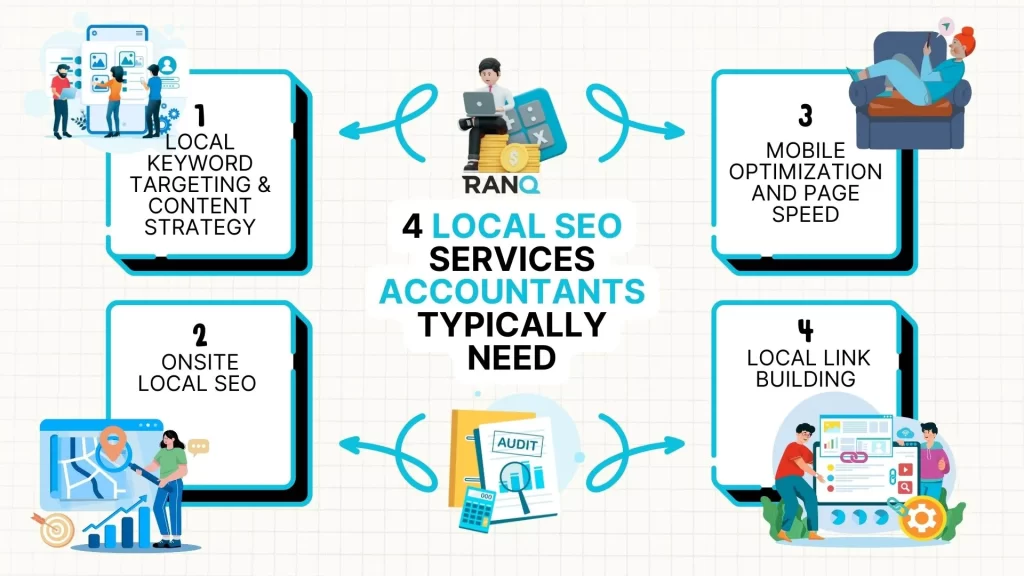Last updated on July 3rd, 2025
As an accounting firm or independent accountant exploring your options for online optimization, you may hope that tools like local SEO could attract hundreds of site visitors. But optimizing your local SEO is about quality not quantity. You only need three to five high-quality leads per month to see ROI.
Local SEO services for accountants are the prime vehicle for reaching that online visibility without relying on referrals alone. In this article, we’ll break down what moves the needle for accounting firms competing locally.
What is Local SEO for accountants?

What does local SEO tangibly mean for you? SEO, or Search Engine Optimization is the practice of improving your online visibility so that your website will rank higher on Google (and other search engines). Statistics show that more than 75% of all prospective customers begin their search online, even in cases where the customers were referred.
That’s why it’s never been more crucial for accountants to appear high in search results like “tax accountant near me,” “Quickbooks help in [city],” or “CPA for small business.”
Do accountants need to use Local SEO to drive more leads?
Referrals are great, but they’re inconsistent and unpredictable as a way to build leads. What happens when that referral dries up, or a competitor starts ranking locally?

The traffic gained through local SEO will provide you with a steady pipeline of leads from people actively seeking help. And those people will search for your firm to check reviews, services, and your location. Those customers may look elsewhere if you don’t have a strong online presence. A strong local SEO foundation helps improve that first impression and suggests credibility.
Why are local SEO services for accountants more beneficial than general SEO?
Clients want accountants who are immediately accessible for meetings, trust, or state-specific tax help. General SEO is effective for attracting broad audiences, but it may also reach people whom your firm can’t or doesn’t serve. Local SEO intentionally narrows your reach to concentrate on the people who are most likely to convert.
1. “Near me” searches are growing, and highly intentional
Trends show that searches like “CPA near me” or “bookkeeper in [city]” signal a readiness to hire. With Local SEO, you ensure that your firm location will appear in Maps, local packs, and other geo-targeted results.
When you optimize for local search, your accounting firm appears in places like Google Maps, the local 3-pack (the top map results shown on a search page), and location-based search results. That visibility can make the difference between someone calling your office or calling your competitor down the street.

And for accountants, that’s key. Most clients want someone local—someone they can meet with in person if needed, someone who understands local laws and tax codes. If your firm doesn’t show up in those “near me” results, you lose out on your most qualified leads.
3. Local SEO builds trust through reviews and real visibility
Local SEO isn’t only about visibility, it’s about building trust with prospective clients.
A strong local SEO setup starts with a complete Google Business Profile. That includes your address, phone number, hours, and, most importantly, client reviews. When people see five-star ratings, clear contact info, and real reviews from other clients, they feel more confident about reaching out. It’s a first impression that shows you’re reliable, responsive, and established in the community.
Local SEO also helps you appear in trusted directories and business listings (called citations), which send even more signals that your firm is legitimate and active. General accountants SEO, on the other hand, doesn’t always focus on these trust factors. It may help you rank for informational content, but it won’t highlight your location, reviews, or client reputation like local SEO does.
For accountants, trust isn’t a bonus—it’s a must. Clients are handing over personal and financial information. They need to feel sure you’re the right choice.
4. Local SEO helps smaller firms compete with bigger players
With local SEO, you’re not trying to outrank national brands for broad keywords like “tax help” or “CPA services.” Instead, you’re focusing on what actually matters: showing up when someone nearby searches for help. Tools like Google Business Profile, Yelp, and industry-specific directories (like CPAverify or AccountingToday) give your firm real visibility right in your neighborhood.

You don’t need a full-time marketing team to win locally. You just need to keep your listings accurate, ask happy clients for reviews, and create helpful content that speaks to people in your area, like “Small business tax tips in [City]” or “What to know about property taxes in [County].”
When you do this well, you appear on the same page as national firms and often above other local competitors who haven’t optimized.
What local SEO services do accountants typically need?

When looking for a good local SEO services firm, these are the services that are especially important to accounting firms. In the next section, we’ll detail what’s involved in each of these practices.
1. Local keyword targeting & content strategy
Local keyword targeting is the process of identifying and targeting geographic and service-based keywords for search engines (e.g. “CPA in Miami” or “tax help for freelancers Dallas”). A good SEO provider will not only research keywords, but also build out localized content around them, which falls into content strategy.
Localized content can include things like:
- City-specific landing pages – Individual ones for each location
- Service pages – Consistent with all other listings
- Blog content related to tax season
- Blog content that incorporates the community
2. Onsite local SEO
Onsite local SEO refers to optimizations that you can make to the backend and content structure of your website in order to improve your local search engine rankings. These optimizations can include things like:
- Adjusting meta titles – Meta titles (or title tags) are what search engines analyze to navigate and rank your website’s page on search engines. They are an HTML element that labels the name of a webpage. Along with the page URL and meta description, they are one of three elements that appear on search engine results pages (SERPS).
- Editing H1s – Another HTML element. H1 refers to the first heading on the page, and it’s essential to whether a search engine finds the material relevant.
- Adding internal linking – These are hyperlinks that point to other pages on your own website. They can signal authority.
- Adjusting Page URLs – There are a series of best practices for page URLs.
- Adding location-specific schema markup. These are also known as structured data.
- Creation or editing of existing content – Creating city-specific service pages and editing existing content with more geographic markers can help signal local relevance of your website to search engines.
3. Mobile optimization and page speed
This service ensures that a website loads quickly and works well on mobile devices, critical for local search rankings and a positive user experience. For accounting, that can include client portals or intake forms. If those pages are slow or break on mobile, potential leads may leave before booking a consultation. Providers should test these qualities using tools like Google PageSpeed Insights or GTmetrix.
Possible optimizations include:
- Image compression
- More responsive design
- Core Web Vitals optimization
4. Local link building
Local link building is the process of earning backlinks (external hyperlinks) from other trusted websites in your area or industry. This could include CPA directories, chamber of commerce sites, local sponsorships, partnerships with adjacent service providers (like lawyers), or even guest blogs on local business blogs. More backlinks will improve your firm’s visibility in local search results and signify legitimacy to Google. This strategy is how smaller firms can compete with larger firms without needing massive marketing budgets.
An example backlink:
A CPA firm in Minneapolis sponsors a local entrepreneur event and receives a backlink from the city’s business development website.
Why is it worth paying for local SEO services for accountants?

Local SEO services for accountants may seem insignificant, but there’s clear data that demonstrates the effectiveness of tools like Google Business Profile and search engine visibility metrics. Take for example, the fact that 46% of all google searches have local intent. And in the case of Google Business Profile, customers are 2.7 times more likely to consider a business reputable if they find a complete Business Profile on Google Search and Maps. This is a case of quality over quantity, and all it takes is one new $3,000/year client to cover SEO costs. It’s an acquisition that’s feasible when more customers see your legitimacy as an accounting firm.
Organic leads are often cheaper (and more loyal) than paid ads
Compared to local SEO, pay-per-click (PPC) ads are both more expensive and disappear when you stop paying. Local SEO accumulates momentum and authority over time, and leads that find you through organic search often convert at higher rates because they trust how they found you.
Local SEO supports referral growth
Local SEO is all about improving your first impression. All clients – even referrals – will Google you. And if you don’t show up, you might lose them immediately to another firm that has local SEO visibility. With reviews, Maps visibility, and content credibility, you are more likely to grow while also validating the confidence prospective clients have in your firm based on a referral.
Local SEO services for accountants can get overwhelming – RANQ can help!
Between Google Business Profile setup, keyword strategy, content, citations, and mobile optimization, local SEO services can be overwhelming to manage – especially for accounting firms focused on client deadlines. But you’re not expected to be an accountant SEO services expert; you’re an expert in your field and you shouldn’t have to worry about these issues.
General SEO agencies can often miss the nuances of financial services (compliance restrictions, local trust-building, seasonal demand), but RANQ specializes in helping service-based businesses like accounting firms build sustainable visibility and lead pipelines. Through robust keyword research, targeted monthly blog content, and regular improvements to site speed, SEO Health, and local SEO optimization – RANQ can help elevate your accounting firm to the best in your community.


